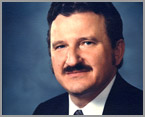Our History
Established in 1984, BRI has grown to be a nationally and internationally recognized research institute that investigates cutting-edge cancer treatments. In everything we do, we are proudly committed to beating cancer.
Dr. S. R. Burzynski
Dr  . S. R. Burzynski, a nationally and internationally recognized physician/investigator, pioneered the use of biologically active peptides for the treatment of cancer. In 1967, at the age of 24, Dr. Burzynski graduated first in his class of 250 students from the Medical Academy in Lublin, Poland. It was at this time that he identified naturally occurring human peptides, which were deficient in cancer patients. He concluded that these peptides played a role in preventing the growth of cancer cells. In 1968, he earned a PhD degree and became one of the youngest physician/investigators in Poland to hold both a MD and PhD degree.
Between 1970 and 1977, he received funding from the National Cancer Institute (NCI) for his work as an investigator and Assistant Professor at the Baylor College of Medicine in Houston, TX. During this time he authored/coauthored 16 publications, including five detailing his work on naturally occurring human peptides and their effect on cancer - four of which were co-authored by investigators associated with the M.D. Anderson Cancer Center or the Baylor College School of Medicine. In May 1977, Dr. Burzynski received a Certificate of Appreciation from the Baylor College of Medicine that acknowledged his contributions to the ‘Advancement of Medical Education, Research, and Health Care’.
Dr. Burzynski has extensive experience investigating the use of Antineoplastons (ANPs) in the treatment of advanced cancers, especially malignant brain tumors, through patient participation in Phase II clinical trials. New phase II and III studies have been reviewed by the FDA and are awaiting Institutional Review Board (IRB) approval.
Dr. Burzynski is the author/co-author of over 300 scientific publication/presentations. He has collaborated with investigators at the NCI, the Medical College of Georgia, the Imperial College of Science and Technology of London, the University of Kurume Medical School in Japan, and the University of Turin Medical School in Italy, among others. He is a member of several prestigious organizations, including the American Association of Cancer Research (AACR), the Society for Neuroscience, the Society for Neuro-oncology, the Royal Medical Association (U.K.), and the Academy of Medical Ethics. As of June 2015, he holds 244 patents in 35 countries covering 17 proprietary scientific inventions.
|

